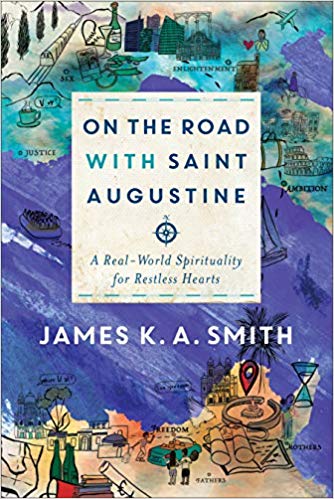After Christ’s apostles, no sinful human being has exerted greater influence on the heart and mind of the church than Augustine of Hippo (354-430 B.C.). Over the last century, scholars have argued that Western church history is, technically speaking, Augustinian. Carl Truman insists, “as all medieval theology was to some extent a dialogue with Augustine, one might say that all medieval theology could be categorized as broadly Augustinian” (Luther on the Christian Life, 32). In the same vein, B. B. Warfield famously described the Protestant Reformation as “the triumph of Augustine’s doctrine of grace over Augustine’s doctrine of the church” (Calvin and Augustine, 321-22).
The relevancy of Augustine today
Even still, James K. A. Smith argues that Augustine’s legacy extends far beyond the Reformation. According to Smith, Augustine is more relevant today than ever before. In the recently published On the Road with Saint Augustine: A Real-World Spirituality for Restless Hearts (2019), Smith presents the North African bishop as a “cartographer of the heart,” someone able to speak to all of life and to every wandering soul (30). “There are ways in which the twentieth century was Augustinian, which makes him our contemporary in ways we haven’t considered” (xiv). In an age of spiritual sojourners, no one speaks more effectively to our innate longing for rest than Augustine, the fatherless, sexually promiscuous, cult-inspired, continent-traversing, knowledge-thirsting, former gang member who discovered that the faith of his cloying mother was not as prosaic as he had imagined. As a result, Augustine’s life provides for us a “hitchhiker’s guide to the cosmos of wandering hearts” (55).
In a sea of literature on Augustine, the greatest strengths of Smith’s work are his fluid writing style, his startling transparency, and his ability to locate Augustinian themes in the least expected places, including his own life. Smith eloquently draws the reader in with modern philosophy and pop culture while honestly presenting his own Augustinian journey. On the Road with Augustine is part historical theology, part cultural commentary, part introduction to philosophy, part biography, and part autobiography.
From Martin Heidegger’s concept of authenticity to the Los Angeles County Museum of Art to Jay-Z’s conflicted memoirs to Charles Taylor’s idea of the “buffered self” to friendship in Good Will Hunting, Smith is able to depict the world as a stage upon which the seminal ideas from Augustine’s life are played out before our eyes. He achieves this through the arch-theme of Augustine’s “refugee spirituality.” According to Smith, Christians are more than pilgrims; we are migrants in search of refuge. And this search is latent in all of us. As Smith labors to show, the human journey is not an Odyssean “departure and return” nor is it a Sisyphean “the road is home.” Instead, as an “ancient ethnographer of our present,” Augustine shows us an “émigré spirituality” where God is our home and rest, not the road. (46, 54) Everything we experience and everything Augustine wrote was subject to this theme (Smith even calls the city of God a “tent city” and a “refugee camp”).
In this sense, there is seemingly no part of human existence wherein Smith does not find an Augustinian theme. If we merely pose church history as Augustinian, we’ve short-changed ourselves. Indeed, history itself is Augustinian. “In many ways,” Smith notes, “modernity is Augustinian” (26). Better yet, “the postmodern is already Augustinian. We are already Augustinian; we just didn’t know it” (34). Where there is longing and searching, there is Augustine the son or Augustine the friend or Augustine the Manichean or Augustine the Ambrosian convert or any number of hats he wore from Thagaste to Carthage to Rome to Milan to Hippo.
Although a litany of Augustine’s works are examined, On the Road with Augustine is very much a confession from the Confessions, drawing out life stories from Augustine’s story. Only Smith could have written this work due to the extent of its philosophical range, its theological devotion, the breadth of knowledge of secular literature, and its cinematic expertise. Anyone could read and appreciate this all-encompassing book. For Smith, Augustine’s Confessions is not a memoir or an autobiography, but a “hetero-biography,” a life told by Augustine and to Augustine from the point of view of God (162). Smith presents his book much the same way.
Finding his own story in Augustine’s
Perhaps the most unique aspect of Smith’s book is his Augustinian willingness to draw back the curtain of his own life and tell his own story, beginning with his arrival at Villanova (founded as an Augustinian order) in 1995 to study Heidegger (inspired by Augustine). By revealing his own spiritual longings, Smith takes an Augustinian approach in recounting his very Augustinian life. The most compelling part of the book is the penultimate chapter on fathers, a topic Augustine had much to say, but, oddly enough, did not always do so. Before expounding an Everclear song from the late 90s and examining Ambrose as the “anti-Patrick” (Augustine’s father), Smith reflects upon his own mind and heart: “Maybe this is what has drawn me to Augustine on an unconscious level: a shared longing for a father I’ve never known. I suspect I’m not alone in this” (200). What follows is a heart-wrenching account of Smith’s fatherless life—a very Augustinian life.
As professor of philosophy at Calvin University, Smith’s name may bring one to expect a very cerebral book with dozens of references to Pelagius or City of God. While these works are mentioned, Smith is much more concerned with pulling back the veil of faux-autonomy and revealing the fact that we, with Saint Augustine, are fellow travelers in this life. Through Hollywood and Rolling Stone articles and by his very own testimony, Smith wants us to see that “we are more Augustinian than we realize” (30).









